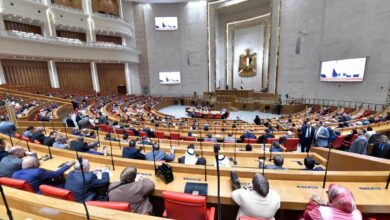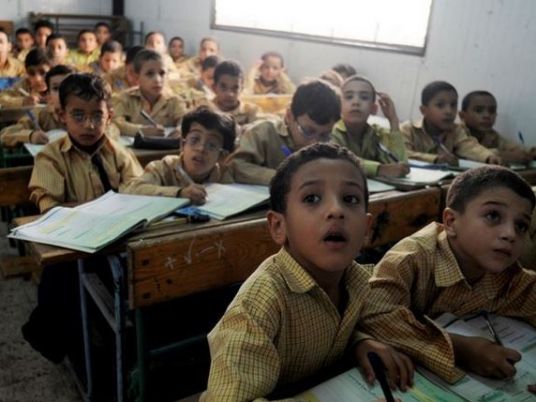Part of education is the enduring, continuous, and sometimes daunting process of trying to achieve the perfect mix of elements that allow an institution to groom individuals. In Egypt, there's no one formula for educational success, with a variety of institutions and potential paths for students.
Schools in Egypt can roughly be categorized as public or private, language schools or international schools, American or British etc., with many more categories and sub-categories as well. Public schools offer their educational services for free and teach the national curriculum, while international schools cater to middle and upper-class families and teach one of many foreign curricula.
AdvancED is one organization that grants accreditation to both public and private schools based on its set of standards. As one of the largest accrediting agencies, operating in 70 countries, the organization is responsible for ensuring its schools comply with and are dedicated to certain educational standards and philosophies. Al-Masry Al-Youm interviewed Sherif El Taweel, managing director of AdvancED regional office in Cairo.
Al-Masry Al-Youm: You played various roles in the educational field. How did that change your perspective on education?
Sherif El Taweel: When you start as a young teacher, all you can think about is your own personal glory and coming up with initiatives every now and then to please your boss. As I moved to administration and worked as the vice principal of my school in the American Section, I got introduced to terms such as vision, mission and standards, and without them, you don’t have a school.
However, at that point, I still viewed the accreditation as a license — a stamp of pass or fail. The first time we went through the accreditation process, we barely passed. The second time, when I became aware of what is quality education and what the accrediting committee is looking for, we passed with flying colors. Switching to the other side of the equation and working with an accrediting agency, I work toward changing the prevailing conception of the accreditation agency as an inspector to that of a guide.
As part of the agency, I work toward the betterment of education in Egypt and the Middle East, not to mention that my position allows me to have a bird’s-eye view of the educational field, since I have the advantage of comparing different schools in different countries and coming to know the unique strengths and weaknesses in individual schools.”
Al-Masry: How does the organization align operating in different cultural contexts with having universal standards that are applied to all schools?
Taweel: Quality is quality everywhere. Our role, as an organization, is to ensure that schools are not just conforming to our standards, but with the self-imposed identity that is mentioned in the mission and vision. The Quality Assurance Review (QAR) team ensures that this image is translated in real life practices within the school and is felt by all stakeholders.
When an institution goes through the accreditation process, the report that is later on published commends the strengths and tries to offer recommendations for the weaknesses. Each school has its unique mix of elements that will consequently lead to varying actions that need to be pursued so as to achieve quality education.
Moreover, one of our standards mandates compliance with the local laws. Hence, when the Egyptian Ministry of Education insisted that international school students salute the flag every morning and study Arabic, religion and social studies in Arabic, we were very supportive of that decision. Furthermore, in the process of assigning the QAR team, we always try to have a local on board to explain the cultural differences to the foreigners.
Al-Masry: How is the student’s identity affected by the discrepancy between the American curriculum and the national curriculum?
Taweel: A curriculum should be dynamic, inspire interest and reflect the changes of student’s needs. In my old school we were very proud to say that we are an Egyptian school teaching an American curriculum. No one is trying to diminish the sense of identity. Our quality standards celebrate diversity. Also, if in Egypt, for example, there is a problem with the national curriculum, why aren’t we developing our own?
Al-Masry: Besides curricula, are there other elements within the school that might influence the student’s identity?
Taweel: My mind would instantly go to the administration. Students are malleable paste; you can shape them any way you like. If the administration is creating an environment of national pride, that feeling will trickle down to the students. However, the organization can’t enforce schools to create that environment.
We only ensure that their vision and mission are applied and are felt throughout the school. The issue of not emphasizing cultural identity to the students varies from school to the other, and it depends on many factors; one of them is the percentage of expatriate teachers. Nonetheless, I know many school owners who give intensive cultural sensitivity courses to their teachers before they embark upon teaching.
We actually accredit different types of schools: American, British, Mandarin, faith-based, vocational. Dealing with the differences that are inherent in each and every type, we felt the need for changing our quality standards.
Thus, in 2013 the new standards will include quality assurances so that every type of school will be admitted to its own unique set of assurances, which is basically a collection of the best practices that we believe should be applied if a school is claiming to belong to that type.
Al-Masry: What motivated the change in the standards?
Taweel: We ask our schools to perform the self assessment and evaluate themselves in order to evolve. We are also required to go through this process of introspection every five years and asses ourselves accordingly. Based on research conducted with educational experts, we’ve reached the decision of changing the standards.
Al-Masry: Getting back to the fact that your organization is operating in different cultures, were there some compromises from the organization and from schools to reach a common ground?
Taweel: The actual practices of the accreditation itself changed in the Middle East versus the US. Back in the early '90s, when the American Diploma was first introduced in Egypt, it started on the wrong foot. The lack of an authoritative governing body lead to chaos, and the negative perception of the American Diploma as the back door to universities.
Thus several steps were taken to rectify the situation. One of those actions is that the QAR visit in the Middle East is three days, whereas in the US it is a day and a half. Schools now aren’t allowed to stamp their own students’ transcripts. All the transcripts are stamped by AdvancED after reviewing, and if grade inflation is suspected, the transcript is held and the school is instantly put on warning.
Rigorous steps were taken to guarantee that quality and integrity are maintained. I believe that during the last five years the level of awareness of students, parents and schools has been drastically raised.
Al-Masry: What would you like to ultimately convey for schools in Egypt?
Taweel: One of the major aspects that I would like to accomplish is to get schools to a point where QAR visits are not an episodic event and that best practices should be well founded in the educational process.




